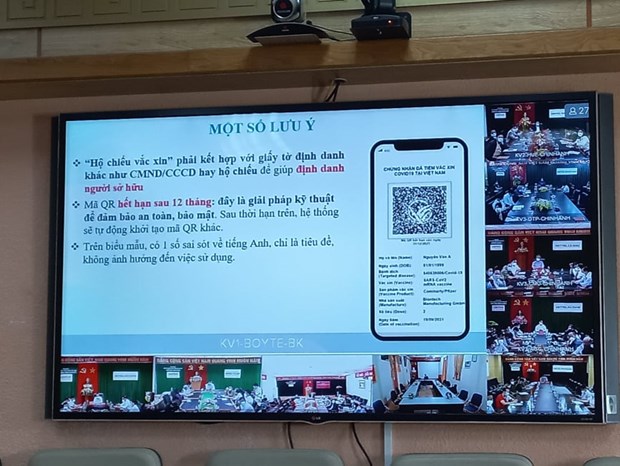Viet Nam to issue vaccine passports from April 15
Viet Nam will begin issuing vaccine passports from April 15, the Health Ministry announced on Monday.
 |
| An example of Việt Nam's COVID-19 vaccine passport is introduced at the meeting held between the Ministry of Health and 63 localities on Monday. — Photo vietnamplus.vn |
Viet Nam has so far reached agreements on the mutual recognition of 'vaccine passports' with 17 countries, according to the Ministry of Foreign Affairs.
They are: the US, UK, Japan, Australia, Belarus, India, Cambodia, the Philippines, the Maldives, Palestine, Turkey, Egypt, Sri Lanka, New Zealand, Singapore, Saint Lucia, and the Republic of Korea.
Head of the ministry's Department of Information Technology Đỗ Trường Duy spoke during a teleconference held on Monday between the ministry and representatives of all 63 localities, urging the issuance of the vaccine passports and saying that to date the preparation work for the issuance has been completed.
The passport will be available on the PC COVID-19 or Digital Health (Sổ sức khỏe điện tử) apps. If people don’t have the apps, they can get their passports by accessing the health ministry's portal and filling in the necessary information. They will then receive the passports by email.
People will not be able to get vaccine passports if their vaccination information is incorrect or they’re not fully vaccinated, Duy said, adding that people should re-check their vaccination information themselves to report errors.
The vaccine passports have 11 fields of information: name, date of birth, nationality, the targeted disease, doses of vaccines received, date of vaccination, lot number of the vaccine batch, type of vaccine, vaccine product received, the vaccine manufacturer, and a code for the certification.
Information on the targeted disease, vaccine, vaccine product or manufacturer will be compatible with the values provided in the World Health Organisation’s "COVID-19 vaccine tracker and landscape" and "Value sets for EU Digital COVID Certificates" issued by the European Union.
Data will be encoded into a QR code. The QR code will expire after 12 months. Following their expiry, people will be notified and a new QR code will be created instead.
Vaccine passports have already been rolled out as a trial from late March for those who have been vaccinated against COVID-19 in Hà Nội’s three major hospitals: E, K and Bạch Mai. In HCM City, vaccine passports have already been trialled for those vaccinated at Gia An 115 General Hospital.
The COVID-19 vaccine certificates are to be issued for people who have received the primary course of one of eight types of COVID-19 vaccines licensed for use in Viet Nam by the Health Ministry: AstraZeneca’s Vaxzevria, Gamaleya Research Institute’s Sputnik V, Sinopharm’s Vero Cell Inactivated along with the manufactured-in-UAE version Hayat-Vax, Pfizer/BioNTech’s Comirnaty, Moderna’s Spikevax, Johnson & Johnson’s Janssen, and Cuba Centre for Genetic Engineering and Biotechnology (CIGB)’s Abdala.
The issuance of the vaccine passports will be applied uniformly across vaccination sites in the country, following three-step procedures, according to the Ministry of Health.
First, vaccination sites are asked to review and verify the information of people to whom they have administered vaccines.
Second, vaccination sites will conduct ‘digital signing’ of vaccination records on the national platform for COVID-19 vaccination management used by health authorities, which will share its data with the management system for certification of vaccinations against COVID-19.
Third, the Department of Preventive Medicine (Ministry of Health) digitally signs the COVID-19 vaccine certificates. The certificates are then issued using QR codes in accordance with EU regulatory standards.
Speaking at the meeting, Deputy Minister of Health Tran Van Thuan said Viet Nam has achieved a high rate of vaccination, ranking one among six countries with the highest vaccine coverage rate in the world.
As of April 4, Viet Nam had administered over 206.5 million vaccine doses. Nearly all adults have received their first dose, 99 per cent their second dose, and 50 per cent have a third dose.
A total of 99 per cent of children aged 12-17 have received their first vaccine shots, and 94 per cent are vaccinated with their second doses.
The ministry and localities are preparing to vaccinate children aged between 5-11 in early April.
Source: VNS